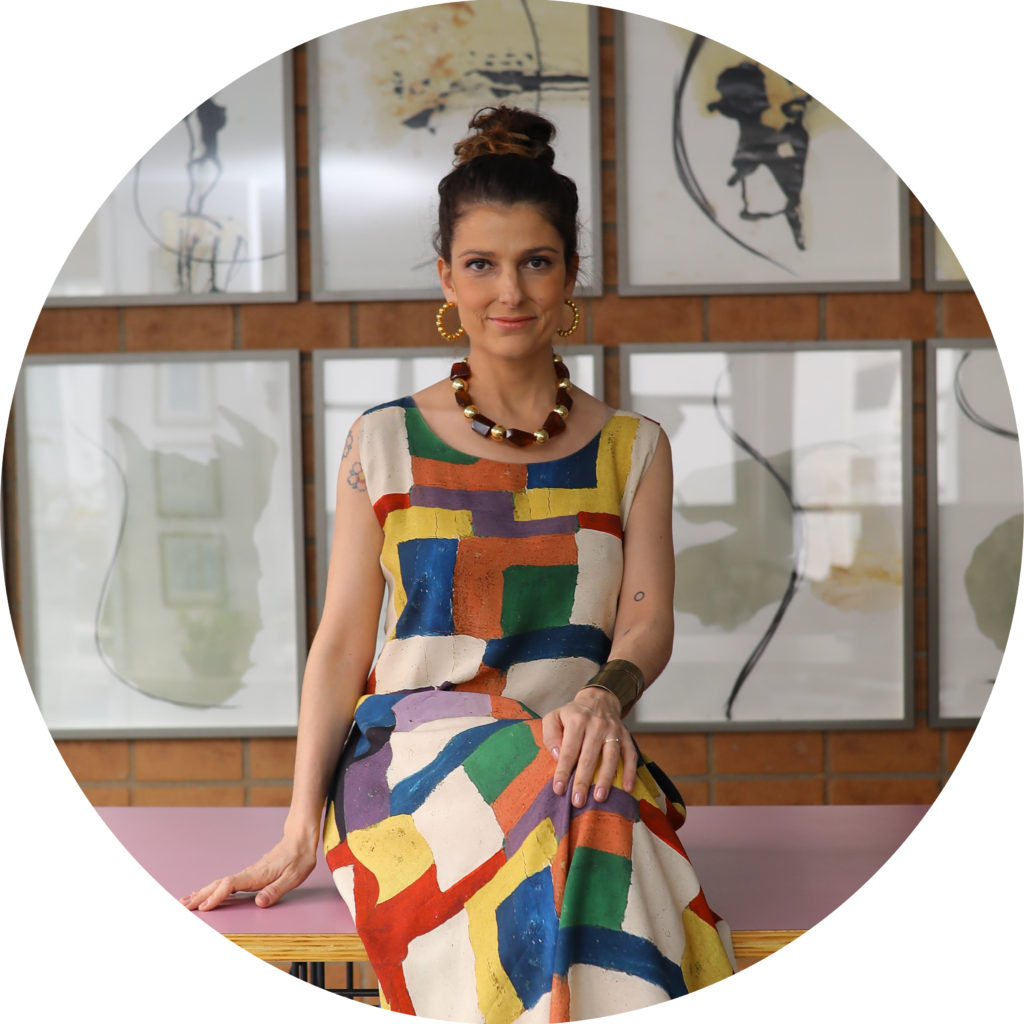
Mostra Museu: a breath of creativity
No começo, era o nada. Quando a pandemia deu seus primeiros sinais, o mundo parou e todos ficamos paralisados. O nada se instaurou. Mas dele, fez-se a luz. A luz do sol que nasce todos os dias, mas também a luz propagada pela tecnologia, que, como uma ligação neural, fez correr a eletricidade pelas veias robóticas e humanas de todos os que viveram tal momento único da humanidade na terra. O que a principio esteve paralisado, então, voltou a correr e a inspirar o nosso microcosmo interior – e logo o exterior. Assim desenvolveu-se a produção criativa em diversas áreas em 2020 e nos anos que vivemos a seguir.
Foi assim também que a Mostra Museu teve início. Se antes era o nada, a partir da eletrizante onda criativa que turbinou a Internet neste período viu-se o brilho que a mente humana pode alcançar. Agora, quatro anos depois, com inúmeras perdas, mas também reflexões e aprendizados adquiridos, nos damos conta do poder interior que nos forma. A experimentação do isolamento nos fez perceber que muitas vezes a criação nasce de um lugar tido como solitário, no entanto, que também é de conexão. Um exercício de troca consigo mesmo em que misturamos memórias, referências e vivências para construir algo inédito que devolvemos ao mundo.
Aos poucos, a comunicação e a mobilidade humana voltaram a caminhar juntas. O que começou no campo das ideias, encontrou-se, então, vívido em mobiliários urbanos, que ocuparam pontos de ônibus, metrôs e trens, e no universo virtual, por meio de acessos a QR Codes espalhados pela cidade de São Paulo, em uma exposição hibrida, online e offline.
Este ano, as obras exibidas na capital paulista em 2021 extrapolam tal ambiente ocupando outras duas cidades do estado, Santos e Campinas. Nelas, criações que foram produzidas durante esse período tão desafiador por artistas de diferentes partes do mundo conectam-se novamente aliadas a uma nova safra de trabalhos feitos por artistas das duas respectivas localidades. Nessa itinerância, a Mostra Museu passa a ser apresentada sob dois temas: “Natureza Conecta” e “Isolamento Criativo”.
Na primeira, artistas de diferentes partes do globo utilizam-se do meio ambiental como estímulo para vincular-se ao seu universo interior. O meio ambiente tem sido para muitos uma forma de descompressão e um lugar, seja ele real ou imaginário, de nos aproximarmos da liberdade e da cura. Já em “Isolamento Criativo” são reunidas obras que têm como pilar o exilio como forma de produção. É por meio desse retiro em direção a uma conexão própria que muitas vezes alcançamos maneiras mais profundas de despertar a criatividade.
A escolha das obras produzidas, sejam elas ligadas às artes plásticas, ao design gráfico, ao cinema ou à animação, tratam sobre aprendizados coletivos e pessoais que períodos de grandes transformações como esse podem alcançar. Se no mundo real a pandemia ganhou contornos e pode ser vista por outros prismas que só o tempo e o distanciamento dos fatos nos permitem alcançar, no das ideias ela segue pujante em um intenso rastro de renovação, que reverbera dentro de todos nós e em tudo aquilo que tocamos depois.
Ana Carolina Ralston
Curator

Ana Carolina Ralston
Visual Arts Curator
Ana Carolina Ralston is an art curator and journalist in Brazil and internationally. She worked as art director at Kogan Amaro Gallery with galleries in both São Paulo, Brazil, and Zurich, Switzerland. She was the curator at FAMA museum, in Itu, Brazil from 2018 to 2020. She is currently editor-in-chief at Moda, a monthly magazine publication about fashion and culture that is part of a well-known newspaper in Brazil, O Estado. She was the senior editor of culture and lifestyle at Vogue Brazil from 2013 until 2018 and responsible for the editions of Harper’s Bazaar Art in 2019. She has a Master Degree in Cultural Journalism from Columbia New York University in Spain. Currently she is completing a post graduate degree in art, critic and curatorship at PUC-SP.
The Covid Art Museum
Visual Arts Co-curators
The Covid Art Museum is the first digital museum to display art created during the coronavirus pandemic. The museum was inaugurated on March 19, three days after the quarantine began in Spain, by Emma Calvo, Irene Llorca and José Guerrero, three creatives who work in the advertising area. The objective of The Covid Art Museum is to collect artistic testimonies about the health crisis, as well as to give visibility and value the works made by artists in their homes, in addition to building connections between people who have the same shared experience.
The works on display on social media have given rise to a pluralist display of what the pandemic means. Each artist brings his own experiences and reflections on this situation. The techniques used in the works are the most varied, including photographs, illustrations, installations, and animations. Today, the project has a digital collection of more than 1,000 works from 120 countries and its founders participate as co-curators of the Mostra Museu – Arte na Quarentena.


In March 2020, the coronavirus officially established a lockdown from our daily activities, and left us with many uncertainties. There was silence in the streets - and in us. The concert halls, the biggest source of income for musicians, closed. Yet, music kept everyone company as they isolated in their homes during a difficult and undeniably historic year. Once again culture helped us to survive, as the artists who provided us with joy reinvented themselves in the silences that surrounded them, never stopping to create.
From their thoughtful and generous heads, they gave us fruits that fed our ears and eyes. New seeds also sprouted in a time of shrinkage. In addition to songs, some of the artists recorded in new formats and from a distance. They gave us audiovisual records that mark a worldwide time full of protocols and care that demanded even more creativity than the normal musical scene.
No system will silence us, no system kept us quiet. Contraflow to asphyxiation and necropolitics, Brazilian culture has bent but not broken. And Mostra Museu is connected to the Brazilian culture through the music throughout the exhibition. This collection of renowned artists and new voices reinvented themselves and added new directions to Brazilian music that was provided even in distance and isolation.
At 70 years of age, Numa Ciro gave us a renovating shower of life and released his first album. From a new and effervescent generation of national rap, Baco Exu do Blues postponed a finished album and made another one - Não Tem Bacanal na quarentena - recorded in just three days, a new work for the present moment.
In this same year, at last worldwide commotion was caused due to racism starting with the murder of George Floyd by the American police. Musically speaking, São Paulo native Jup do Bairro emerged with her manifest album "Corpo Sem Juízo," which explores themes such as sexuality and gender from real life stories in the favelas. It is from the favelas too - those in Bahia - that came one of the best surprises of 2020: Yan Cloud and his album "Pinkboy."
From a show made months before the pandemic, Emicida brought us a documentary-lesson on Brazilian black culture and, as a gift, a meeting with Gilberto Gil. "To live is to leave, go back and share" says the song "É Tudo pra Ontem." Leave, go back, and share - is how Brazilian music flowed and continues to flow. We must put ourselves in our present time, without forgetting the past, in order to share in the expectation of a future in which art is better understood.
The pandemic has redefined the power of being heard, listened to, and shared. Brazil is much bigger and more diverse than it seems. It is feminine, black, indigenous, LGBTqIA+. It is this Brazil that should inspire us and needs to be listened to more so that our soundtracks have a little more love, awareness, and freedom in being and existing. So that, thus, we can meet together in shared understanding - and soon. Promises are held in 2021. Listen to the playlists of the Mostra Museu and watch the videos. They have a lot to tell us.
Pedro Henrique França
Curator
Pedro Henrique França
Music Curator
Pedro Henrique França is a journalist, director, and screenwriter. As a journalist, he worked and wrote about music in newsrooms such as Estadão and Joyce Pascowitch. He also finalized the direction and script for the video clips Nobody Asked for You", by Letrux, "De Ontem", by Liniker , "Náufrago", by Majur, and "Pedrinho", by Tulipa Ruiz - It was the winner of the best film at the Vitória Film Festival in the Music Video category, and best film and direction at the Los Angeles International Music Video, plus nominated for the MVF, Music Video Festival.
He founded the collective Representa, which is dedicated to audiovisual projects with a focus on promoting diversity. He was a curator and mentored Natura Musical 2020, which included more than 40 artists, bands, and cultural collectives.

